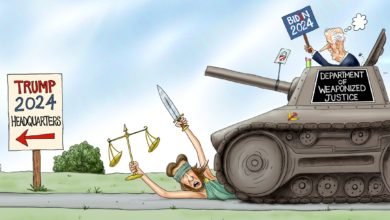The Walls That Divide Us
 It is a given in Western society that we should want to break down the barriers that divide us. Compassion, understanding, empathy – who could possibly be against those things?
It is a given in Western society that we should want to break down the barriers that divide us. Compassion, understanding, empathy – who could possibly be against those things?
And we are not only Americans. We are also people, a part of common humanity, citizens of the world. Those things that make us individuals – our ethnic heritage, our skin color, our gender identity – they make us unique, but equally diverse.
We have to unite if we are going to overcome our differences. We must set aside our petty, greedy, selfish nature if we are going to make a better world.
Right?
Wrong. This is an extremely dangerous mindset and one that fosters the drive for the totalitarian state. The essential problem lies in the inability of the “compassionate” left to discriminate between immoral and moral means. When collectivist aims and coercive means mix, the result is volatile and often explosive.
Many who feel alienated by society, and not just capitalist society but any society, are driven out of loneliness and feelings of insignificance to support collectivist political causes. They may be motivated out of “love for humanity,” and feel themselves to be “helping the world.” But their desires to use any means possible to “change the world” for the better are just misguided.
Government is a poor and even disastrous channel for such sappy sentiments.
When fundamentally compassionate but irrational people meet resistance from conservatives, those humbugs who support the divisive and selfish ideology of individualism, they may at first feel baffled, and then outraged.
Who could possibly be against helping the poor? Why would anyone want to take away benefits from the elderly? That’s just plain evil.
But there is a fundamental disconnect in the leftists’ logic. They never see themselves as harming others or the society as a whole with their policies.
People need to be helped, and if society won’t help them, government must!
There was a period in human history, before The Enlightenment, when emotion and arbitrary government ruled the day. It was called the Dark Ages, and it was named as such for a reason.
No barriers existed between most people. Superstition and mutual suspicion of outsiders or eccentric individuals was rampant. The king could generally do whatever he wanted to any individual – seize his property, silence him, or even kill him – without political consequences.
The people were united, and holy wars were rampant. Fervor bled over into violence, often in the name of helping others through religious conversion. This was not just in the Christian world, but throughout all of Eurasia.
There were few real boundaries on what could be done to a person not of the right lineage. Of course, there were divisions between the nobles and the peasantry, and between principalities. But the majority of mankind was an indistinguishable mass.
This was not a world of freedom.
The key reason men were not free was because they were not secure in their person, or in the fruits of their labor. While religious fanaticism kept society closely restrained, the nobility were politically at license to directly confiscate all but a modicum of subsistence from the peasants.
Capitalism changed all that.
When the castles crumbled around Europe, as peasants were able to depart from the protection of their paternalistic caretakers, initially serving the tastes of rich, but then forming small enterprises – trading freely, laboring as they were able – that was when the walls dividing the entrenched nobility and permanent underclass began to crumble and freedom began to first blossom.
The institutions of private property, capital, and the rule of law were able to provide the basic order needed for human beings to flourish. And flourish they did.
Without individual security, and the ability for the individual to provide for himself, there could be no freedom. Once all were understood to be protected equally, people could devote themselves fully to working and improving themselves. They had to respond to the needs and wants of others, or fail to provide for themselves.
That was the beauty of market individualism – it was inextricably tied to others’ desires, and though it did not allow coercive parasitism, it did not rule out voluntary charity either.
Capitalism is not only a functional, but an eminently moral system. And it works.
Some people became rich, and all classes rose in living standards. Only a minor fraction of the public exemplified personal tragedy – unable to work and provide for themselves, and unable to find voluntary help.
Such anomalies were intolerable for those who saw equality as sacrosanct, and desired a perpetually humane utopia. And paradoxically, they were willing to put power in the hands of the few in order to achieve it. That was literally a fatal mistake.
Karl Marx came along and struck a cord with such visionaries, promising a world to his followers where all men worked voluntarily and shared the fruits of labor equally. A classless society where no boundaries between people existed.
Only Marx wasn’t even able to describe this perfect society or how it would work in practice, except in the most glossy and glancing terms. Not only will you not find such a relation in his works, but Marxian experts are simply baffled by the question of what would happen after capitalism were to be destroyed.
Planning is inherently reactionary, you see.
For many, Marxism has become a religion in a world where god is presumed dead; a vision of a perfect world without boundaries to divide us. But for those who know history and can imagine how such a world would work in practice, such a place is an intolerable nightmare – a world of stifling conformity, individual disposability, and unlimited state power.
Kind of like the direction America is heading in now.




